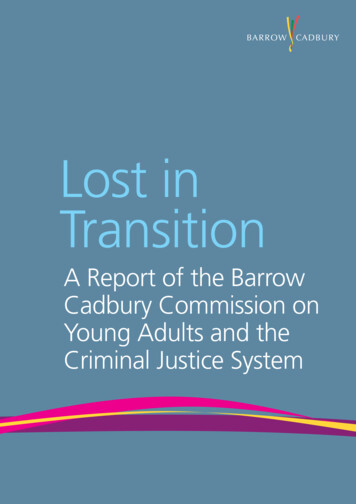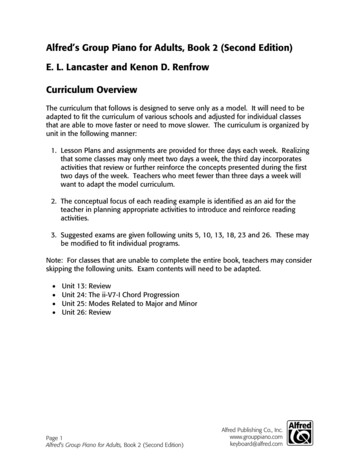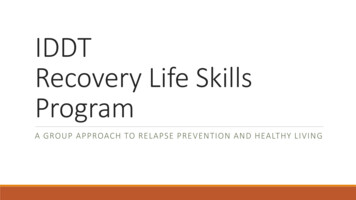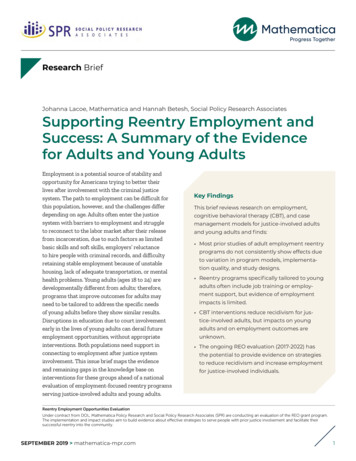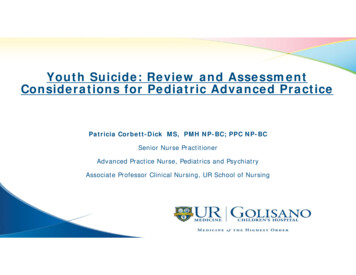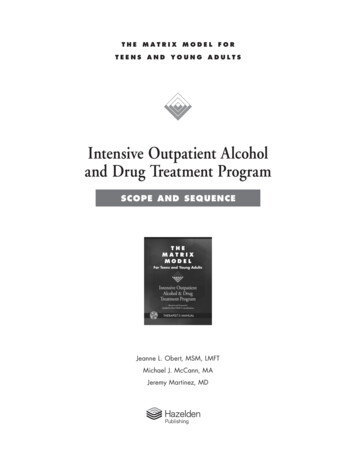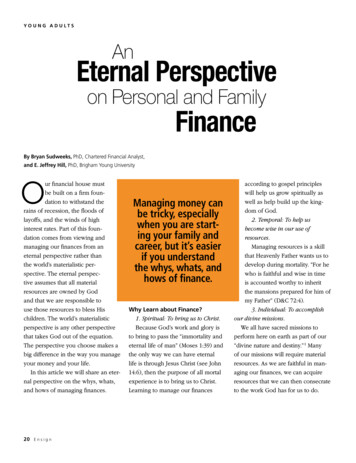
Transcription
YOUNG ADULT SAnEternal Perspectiveon Personal and FamilyFinanceBy Bryan Sudweeks, PhD, Chartered Financial Analyst,and E. Jeffrey Hill, PhD, Brigham Young UniversityOur financial house mustbe built on a firm foundation to withstand therains of recession, the floods oflayoffs, and the winds of highinterest rates. Part of this foundation comes from viewing andmanaging our finances from aneternal perspective rather thanthe world’s materialistic perspective. The eternal perspective assumes that all materialresources are owned by Godand that we are responsible touse those resources to bless Hischildren. The world’s materialisticperspective is any other perspectivethat takes God out of the equation.The perspective you choose makes abig difference in the way you manageyour money and your life.In this article we will share an eternal perspective on the whys, whats,and hows of managing finances.20 E n s i g nManaging money canbe tricky, especiallywhen you are starting your family andcareer, but it’s easierif you understandthe whys, whats, andhows of finance.Why Learn about Finance?1. Spiritual: To bring us to Christ.Because God’s work and glory isto bring to pass the “immortality andeternal life of man” (Moses 1:39) andthe only way we can have eternallife is through Jesus Christ (see John14:6), then the purpose of all mortalexperience is to bring us to Christ.Learning to manage our financesaccording to gospel principleswill help us grow spiritually aswell as help build up the kingdom of God.2. Temporal: To help usbecome wise in our use ofresources.Managing resources is a skillthat Heavenly Father wants us todevelop during mortality. “For hewho is faithful and wise in timeis accounted worthy to inheritthe mansions prepared for him ofmy Father” (D&C 72:4).3. Individual: To accomplishour divine missions.We all have sacred missions toperform here on earth as part of our“divine nature and destiny.” 1 Manyof our missions will require materialresources. As we are faithful in managing our finances, we can acquireresources that we can then consecrateto the work God has for us to do.
July 201621ILLUSTRATION BY ROCCO MALATESTA
4. Family: To return with ourfamilies back to Heavenly Father’spresence.An eternal perspective on financescan prepare us for eternal marriage,strengthen existing marriages, andbe a conduit for positive parenting.President David O. McKay (1873–1970) reminded us, “No other successcan compensate for failure in thehome.” 2 We will be disappointed inlife if we gain the riches of the worldand lose our families (see Matthew16:26).What Are the Foundations of ThisPerspective?Principle 1: OwnershipThe Psalmist wrote, “The earth isthe Lord’s, and the fulness thereof;the world, and they that dwelltherein” (Psalm 24:1). The Lord isthe Creator of worlds and all thingstherein (see John 1:3; D&C 93:10),the supplier of our breath, the giverof our knowledge (see Moses 7:32),the giver of our life, and the giverof all we have and are (see Mosiah2:21–25). Nothing we have is ourown—it is all God’s. As such, thereshould be no feeling of pride or22 E n s i g nownership for the things He blessesus with.Principle 2: ResponsibilityBecause God owns everything,we have a responsibility to use theseresources for His purposes. We firstmeet the needs and appropriatewants of our families and then consecrate the rest to bless God’s otherchildren. Being blessed with materialthings in life should be seen not onlyas a blessing but also as a responsibility, “for of him unto whom much isgiven much is required” (D&C 82:3).Principle 3: AgencyPresident Thomas S. Monsontaught: “When we came to the earth,we brought with us that great giftfrom God—even our agency. Inthousands of ways we are privilegedto choose for ourselves.” 3 How weuse that gift in managing our financesis one way we show what we believeand how much we love HeavenlyFather and His Son, Jesus Christ.Principle 4: AccountabilityThe first three principles outlinedabove are God’s gifts to us. The principle of accountability can be our giftto God to show how much we loveHim through our obedience.How Can We Best Apply TheseFinancial Principles?1. Pay the Lord first in tithes andofferings.Tithing is the primary law uponwhich financial blessings are predicated. If we pay tithing and are generous with fast and other offerings,we are promised that the windows ofheaven will be opened (see Malachi3:10). Paying tithing is a reflection ofour faith.2. Create and use a budget.Prophets have counseled thateveryone should have a budget.4Budgeting is the process of pondering, planning, setting goals, andfollowing through on our financialplans and goals. If you are married,you can develop your budget withyour spouse. Most budgets includea monthly plan for expenditures bycategory (such as tithing, investments, food, housing, clothing,insurance, medical expenses, cars,entertainment, and so on) and thenan annual budget for other plannedexpenses, such as Christmas, vacations, and birthdays. The totalexpenses should be less than the netincome.
It is important to review expensesregularly, perhaps weekly, to assessthe current status of the budget.When followed, a well-designedbudget helps keep us out of debt.You can find sample budgets onnumerous Internet sites, includinglds. org/ topics/ family -finances andpersonalfinance. byu. edu, and onmany apps.3. Avoid debt.We have repeatedly been counseled to avoid debt wherever possible. President Ezra Taft Benson(1899–1994) taught: “The Lorddesires his Saints to be free and independent in the critical days ahead.But no man is truly free who is infinancial bondage.” 5 And PresidentGordon B. Hinckley (1910–2008)urged Church members: “Be modest in your expenditures; disciplineyourselves in your purchases toavoid debt to the extent possible.Pay off debt as quickly as you can,and free yourselves from bondage.” 6The only exceptions to this counsel are debt for a modest home, foreducation, and perhaps for basictransportation.7 Consumer debt—that is, debt for lifestyle items likeclothes, electronics, vacations, and soon—should be avoided.If you are in debt, follow a debtelimination plan and cut spendingwherever possible.Learn and apply responsible useof credit cards—such as regularlypaying them off and only spendingmoney you have. If they cause toogreat a temptation to spend, performwhat Elder Jeffrey R. Holland of theQuorum of the Twelve Apostlescalled “plastic surgery” and cut upyour cards.8 However, don’t closethe accounts, as simply having youraccounts open (even if they are notbeing used) can help build your creditscore over time.4. Prepare for emergencies andbuild a financial reserve.Most financial planners recommendhaving three to six months’ worth ofliving expenses set aside in an easilyaccessible savings or money marketaccount as a cushion for unexpectedfinancial difficulties. That money isready to be used when truly needed:in case of a lost job, medical bills,unplanned home or car repairs, travelto a funeral, and so on.5. Save for short- and long-termexpenses.After a reserve is built, you canbegin saving for short- and longterm goals. Some short-term goalsmay include purchasing a vehicle orBuild a Debt Snowball: Pay off onedebt as fast as possible and then use themoney that is freed up from that firstdebt to pay off the next and so on untilall your loans are paid off.July 201623
buying furniture. It is gratifying to saveand sacrifice for these goals.Many couples set the goal to owntheir own home. It is appropriate toborrow for a modest home, but becautious. A mortgage will likely beyour largest financial obligation andwill impact your budget and financesuntil the day it is paid off. Shorterterm mortgages (say, 15 or 20 yearsas opposed to 30 years) require muchless debt to be paid over time.Saving for retirement is anotherlong-term goal. If your employeroffers a matching contribution to aretirement fund, it is wise to contribute at least enough to get thefull match. If your employer doesnot offer a retirement plan, you canestablish your own long-term savingsand retirement plans. You may alsowant to save for missions and education for your children.Begin to invest now while you havetime on your side. The sooner youstart investing, the greater your moneywill grow. Albert Einstein supposedlysaid: “Compound interest is the eighthwonder of the world. He who understands it, earns it. . . . He who doesn’t,pays it.” 9Where possible, invest in taxadvantaged, primarily stock-based,diversified mutual funds consistentwith your ability to tolerate risk.Invest for the long term and don’t tryto time the market.6. Protect yourself and your familythrough adequate insurance.Without insurance, major financialsetbacks could wipe out decadesof savings. Adequate insurance thatprotects major investments providespeace of mind.Elder Marvin J. Ashton (1915–94)of the Quorum of the Twelve ApostlesCheck the Termsof Loans: Couple Achooses a 30-yearmortgage for theirnew home. CoupleB chooses a 15-yearmortgage. Evenwith the sameinterest rates,couple A pays morethan twice as muchin interest as coupleB over the life ofthe loan.counseled: “It is most important tohave sufficient medical, automobile,and homeowner’s insurance and anadequate life insurance program.Costs associated with illness, accident, and death may be so large thatuninsured families can be financiallyburdened for many years.” 10Once you have someone who isdependent upon you for income,consider getting life insurance. Thegoal is to have enough insurance toreplace your income for long enoughto raise your children and for yourspouse to be financially self-sufficient.Some financial planners recommend10–15 times your gross annual salary.In general, term life insurance is preferable to permanent life insurance.SummaryUnderstanding the doctrine, principles, and application of financialmanagement is critical. With everydollar we spend, we choose whichperspective we take—either theeternal perspective or the world’smaterialistic perspective. God prepares a way for us to obey His commandments concerning our finances(see 1 Nephi 3:7). With this eternalperspective, you lay up for yourselvestrue “treasure in heaven” (Helaman5:8) as you plan for and begin yourcareers and families. Note: As you make large financial decisions, itis important to obtain adequate and accurateinformation before prayerfully making a decision.Many books, websites (such as lds. org/ topics/ family -finances and personalfinance. byu. edu),and experienced financial advisers can help youwith these decisions.24 E n s i g n
LEARNING THE FINANCIALJARGONThis brief glossary defines some of theterms in this article that might be newto you.Diversified investments: Investingyour money in many different types ofassets—such as stocks, bonds, real estate,commodities, precious metals—in order tominimize risk (don’t put all of your eggs inone basket).Life insurance: Term life insurance coversthe insured person for a certain period oftime, such as 20 years. It typically costs lessthan permanent life insurance, which covers the insured for his or her lifetime andincludes an investment component.Matching contribution (in a retirementinvestment, such as a 401k): For everydollar employees contribute, employerscontribute the same amount or a certainpercentage to the employee’s retirementplan.Risk tolerance: Your psychological disposition to handle the ups and downs of thefinancial markets without undue stress.Start Investing Early: From age 25 to 65, investor A saves 100 permonth earning 6 percent interest and ends up with 199,000. From age35 to 65, investor B saves 100 per month earning 6 percent interest andends up with 110,000.ILLUSTRATIONS BY ROCCO MALATESTANOTES1. “The Family: A Proclamation to the World,”Ensign, Nov. 2010, 129.2. Teachings of Presidents of the Church:David O. McKay (2003), 154.3. Thomas S. Monson, “Ponder the Path ofThy Feet,” Ensign, Nov. 2014, 86.4. See Teachings of Presidents of the Church:Spencer W. Kimball (2006), 198; L. TomPerry, “Becoming Self-Reliant,” Ensign, Nov.1991, 66.5. Teachings of Presidents of the Church: EzraTaft Benson (2014), 271.6. Gordon B. Hinckley, “To the Boys and tothe Men,” Ensign, Nov. 1998, 54.7. See Robert D. Hales, “BecomingProvident Providers Temporallyand Spiritually,” Ensign, May 2009,7.8. See Jeffrey R. Holland andPatricia T. Holland, “Things WeHave Learned—Together,” Ensign,June 1986, 30.9. Albert Einstein, -the-eighth-wonder-ofthe-world-he.10. Marvin J. Ashton, One for theMoney: Guide to Family Finance(booklet, 2006), 10.Tax-advantaged investments: Fundswhere you can invest your money andpay fewer taxes. Some common optionsallow you to deduct your investment fromyour taxable income (such as traditionalIRA’s/401k’s) or allow you to accumulategains without ever paying taxes (such aswith Roth IRA’s/401k’s or tax-exempt bonds).Timing the market: The difficult-toimplement practice of trying to buy stockwhen its price is low and sell it when theprice is high. A better approach is dollarcost averaging —investing a set amount ona regular basis.July 201625
Jul 10, 2016 · on Personal and Family Finance and E. Jeffrey Hill, PhD, Brigham Young University according to gospel principles will help us grow spiritually as well as help build up the king-dom of God. 2. Temporal: To help us become wise in our use of resources. Managing resources is a skill that Heavenly Father wants us to develop during mortality. “For he
